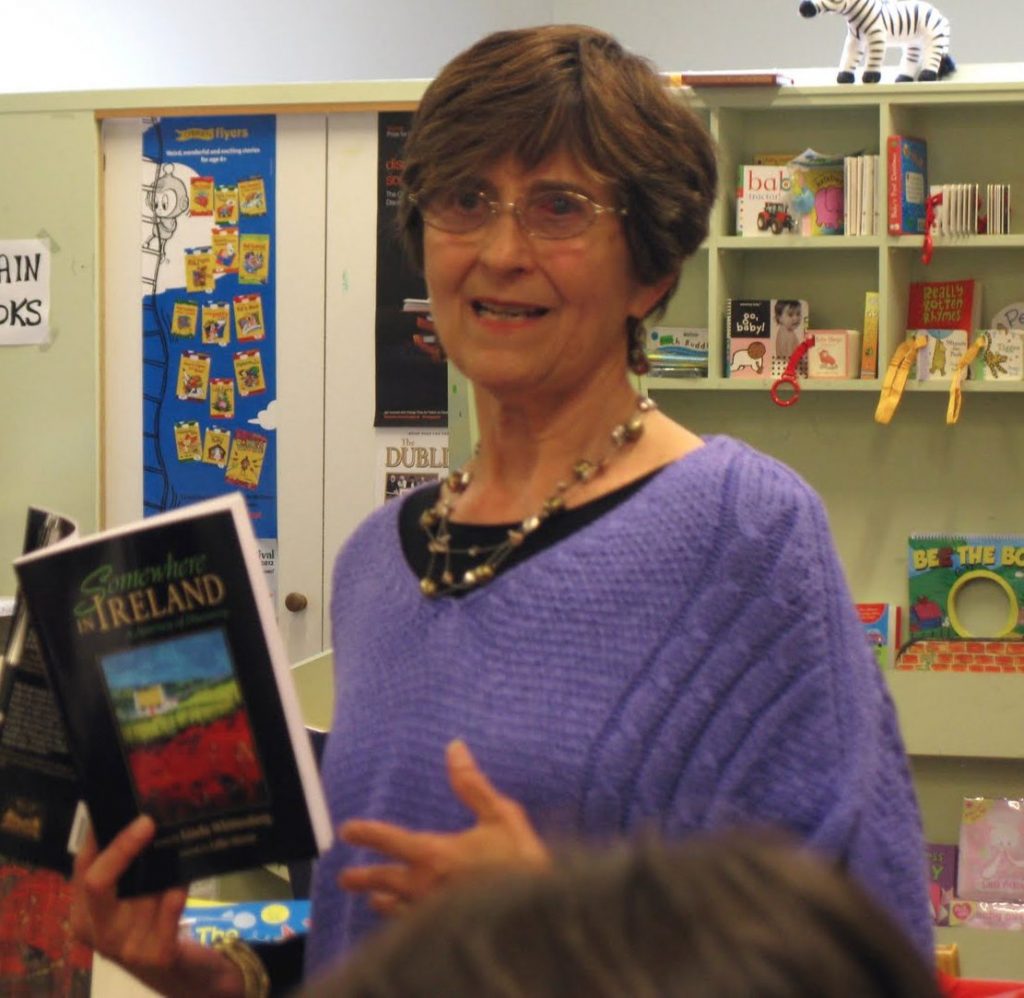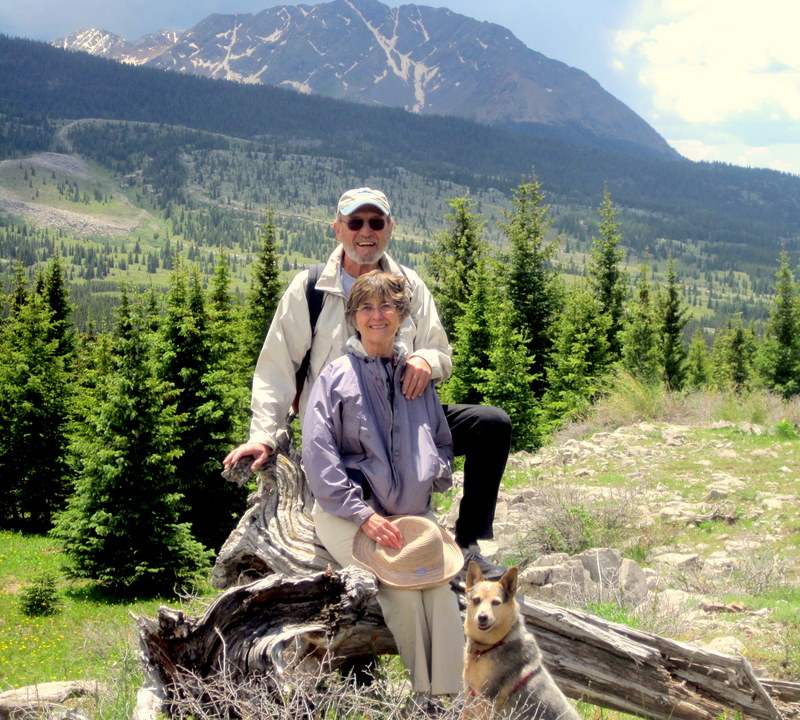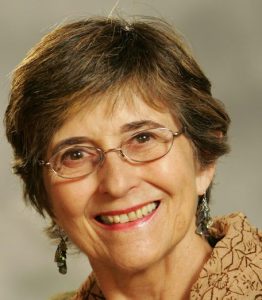New Poems from Linda Whittenberg
Linda Whittenberg first connected with Ireland through her beloved Irish grandfather, Will Shannon, with whom she spent her childhood in the Illinois farmland where she was born. As a Unitarian-Universalist minister in the United States, she served congregations in the West before launching her voice as a poet. During Writers’ Week in Listowel, County Kerry, in 2014, she launched her book Somewhere in Ireland (Black Swan Editions, 2014), which narrates in poetry her narrative of her experiences in the land of her Shannon ancestors. Whittenberg finds herself drawn to this “land of her ancestors” and returns often, almost annually.
 Linda Whittenberg launches Somewhere in Ireland, in Wolfe’s Bookstore, Listowel, Co. Kerry 2014
Linda Whittenberg launches Somewhere in Ireland, in Wolfe’s Bookstore, Listowel, Co. Kerry 2014
In the recent poems she shares with Trasna, Linda Whittenberg experiences the essence of her late husband, Robert Wilber, in the forms that make his formless presence both real and near. Though she has parted with so many of his belongings, his spirit is innately a part of everything that he touched and every moment that they shared–his hat, the view from the mesa, the tent. He is there, he is not there. She embraces his being and feels his loss with a tenderness that is intense and inspiring.

The Haunting Hat
Your cowboy hat still sits as you left it
on the hall closet shelf, chin strap tied up
to shape the brim. I reach for a scarf—
there you are.
Knowing I liked that hat,
you always wore it to the airport
when you came to pick me up.
There you were—
my handsome cowboy, waiting to welcome
me home.
The boots I gave to Goodwill, journals
fit nicely in a drawer, wedding ring made
by our Navajo friend resides in my jewelry box.
But the question gnaws—
how long do I keep the cowboy hat
with your sweat in the band?
Start Anywhere
Take the garage—
piles for Goodwill, the backpack
you wore up and down mountains
forty years, tents where our co-mingled breath
beaded on the interior, all kinds of gadgets
for repairing, installing, maintaining.
Chances are good,
no matter where you start, the toolbox
will get you even more than the closet
or dresser or desk. For me it was because
this was the toolbox he brought
to our marriage, a dowry of sorts,
tools to fix most anything.
The claw-hammer handle still carries
traces of where he gripped it
building a ramada toward the back
of the yard, a sort of free-standing porch
on a high place for the best view
of moons that rise over the mountains
on cool summer nights.
Start anywhere
and you’ll come to this—
how proud he felt, although
he wasn’t one to brag,
snuggling and swinging with his woman,
dogs at our feet,
horses and mules in the paddock,
even an exceptional goat,
glories of love in the moonlit dark.
Astronomical
In the midst of tumult, when sleep
is hard to secure, I wake
to step out on flagstone and study
the sky which greets me
with a crescent moon hovering close
to a morning star, a pair so brilliant
and full of hope for a few seconds
I almost forget all I am losing,
even allow a flash of delight.
Two astronomical wonders cuddling
so close they appear inseparable,
but I am not dissuaded from my grief,
for I know days ahead a different sky
will display another vision of reality,
a lone star, probably faithful Venus,
less illuminating, yet, still shining,
still doing her part to light up the sky.
Sangre de Cristo
Tender perennial sprouts appear, the clematises out front buds,
apricot leaves uncoil, overhead, migrating birds.
I fill the feeder.
My heart beats faster this time of year, plans form,
summer stretches ahead like Route 66, promising
a ride in a convertible.
It is an especially fine spring day when you come home
from the doctor and plunk down a packet of papers
in the middle of the round oak kitchen table.
The lion paws on that table want to run. This table
where children formed awkward letters
on yellow, blue-lined pads. Oatmeal every morning.
That blue packet stared me down, the way two people play
who blinks first. Dr. Jackson that day he first came in the room,
saying, At last, a normal-sized person, for he too was very tall.
Today, he must have stuttered through what had to be said.
Did he look directly at you, with the news?
Dear Dr Jackson, it must have broken his heart.
I read, but the letters swarm like bees, making it hard
to take in. Why is it always spring when bad news strikes—
both my father and mother, my dear cousin, and now you?
We’ll go outside together at sunset. My Love,
the sun going down
will most surely turn the mountains blood-red.
Since You’ve Been Gone
Remember how we watched the insect-sized
bicyclist cross the vast terrain below
while we stood on the mesa? How strange
it was to realize that little dot was moving?
Then we were captivated by the thought
of him, his thighs aching, heavy breathing,
as he became human. Maybe that’s how it is.
I must look closely, for all that was you
could not have disappeared completely.
You were large, a real cowboy in your hat
and boots, and when you were on horseback,
you were grand. Your mind was expansive,
spacious enough to hold nearly all of
Indian territory, the Civil War, WWII,
politics, music, nature, and much poetry.
That’s why I set aside reason and squint
to look up close, use a telescope to see far
or I might miss a sign, a hint,
a keyhole glimpse of you in some other form.
There are times when I reach out for you at night
in my restless stirring, and find you there
for the second before I touch the empty sheets.
Perhaps, it’s something like
wondering where the rose goes in winter.
How I fret, thinking perhaps my favorites
will not make it, and then, one spring day
I am surprised by the first budding. That’s
a way to think of it—you are not gone,
merely dormant.
I will go to the mountain in late summer
to see if the aster seeds we planted
with your ashes have made it into flowering.
I don’t know how far away
heaven is or if there even is one,
but I keep looking.
 Linda Whittenberg was born in Illinois farm country, small-town America. She knew every person in that little town, and, thus, has come to know people everywhere she goes, hoping to turn the world into a small town. Moving to New Mexico in 1976, she felt she had found her heart’s true home and continued feeling that for more than forty years, even though she left for a time to attend seminary and become a Unitarian Universalist minister. She served congregations in California and Washington State. On retirement, she began writing and has published five books of poems. One, Somewhere in Ireland, Black Swan Editions, 2014, was launched during Writers’ Week in Listowel, County Kerry, Ireland. The Irish link is her Irish grandfather, the father-figure who nurtured her childhood, doing his best to make up for the father she never knew. She has returned to Ireland seven times in ten years and plans at least one more trip next year. After the death of her beloved husband in 2020, she has moved to Denver, Colorado where her three children and their families all live nearby. Her books are available through Amazon.
Linda Whittenberg was born in Illinois farm country, small-town America. She knew every person in that little town, and, thus, has come to know people everywhere she goes, hoping to turn the world into a small town. Moving to New Mexico in 1976, she felt she had found her heart’s true home and continued feeling that for more than forty years, even though she left for a time to attend seminary and become a Unitarian Universalist minister. She served congregations in California and Washington State. On retirement, she began writing and has published five books of poems. One, Somewhere in Ireland, Black Swan Editions, 2014, was launched during Writers’ Week in Listowel, County Kerry, Ireland. The Irish link is her Irish grandfather, the father-figure who nurtured her childhood, doing his best to make up for the father she never knew. She has returned to Ireland seven times in ten years and plans at least one more trip next year. After the death of her beloved husband in 2020, she has moved to Denver, Colorado where her three children and their families all live nearby. Her books are available through Amazon.
Beautiful work, Linda.
I met Linda at a Poetry Workshop in Bantry some years ago. A lovely, kind person and a fine poet. Sorry to hear about the passing of her husband Robert.
I am entranced by Linda Whittenberg’s poetry! It rings of truth, beauty, love, humanity and authenticity . . . as does its author. Even the ones about sadness and grief bring comfort to me. I knew the first time I met her and heard her poems that I had been given a great gift!